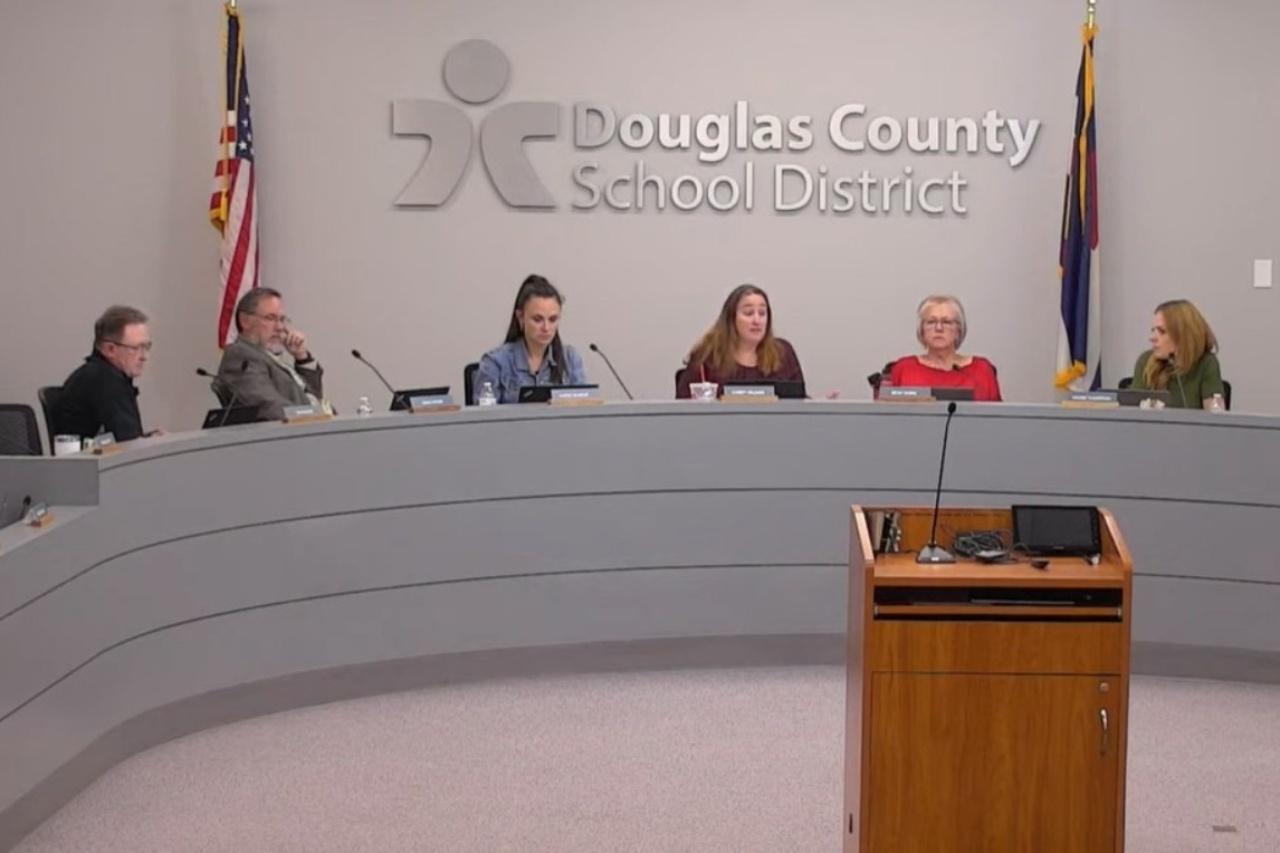
For its final meeting on Tuesday, the lame duck majority on the Douglas County school board added two controversial items to the agenda late last week: a discussion on transgender athletes on school sports teams and a resolution granting some charter schools a chance to operate with 10-year contracts.
The items were placed on the agenda Friday, leaving five days for the public to review. The outgoing members of the board are Tim Moore, Becky Meyers, Kaylee Winegar and board president Christy Williams. The four did not seek re-election and an ideologically like-minded slate that was to replace them didn’t win.
“I'm incredibly frustrated that just one week after the election, where voters were really clear that they did not fall for the extreme agenda that the other side was trying to sell, that this board would then try to push a trans athlete issue onto the agenda with their last public meeting,” said parent Kelly Mayr who heads up a group, Douglas County Parents.
The remaining board members, Brad Geiger, Susan Meek, and Valerie Thompson, who will be joined by four new members promising a return to pragmatism, accountability and getting politics out of school board policies, are also upset.
“It's despicable,” said Brad Geiger. “Director Williams chose not to run. She didn't choose to put herself out there for the voters. She doesn't care about what the public wants. She chooses to ignore elections that she doesn't like.”
Williams could not be immediately reached for comment.
Charter school contract extension
Currently, charter schools — publicly funded but independently run —must renew their contracts with the district every five years. The board majority wants to allow high-performing, long-standing charter schools the ability to renew their contract every 10 years.
The resolution would make the 10-year extension option available to all of the 18 charter schools in the district.
“It is appropriate to acknowledge the longevity and consistent successful performance of each such eligible charter school,” said the resolution.
The resolution states that it does not alter charter schools’ responsibilities, reporting or performance requirements and that the board still maintains existing oversight rights. Charter schools would still have to appear before the board for a mid-term review, though it isn’t defined.
Geiger said he can see a longer contract on a case-by-case basis but is opposed to a ‘blanket’ extension.
“They don't have to tell us anything about how effective they're being for an entire decade. Remember, these are public schools spending public money. To take them completely out of the hands of the elected officials because you don't like the elected officials on the school board is deeply concerning to me,” he said.
He argues that there are no stakes in the ‘mid-term review’ and to get an automatic renewal, “you have to be slightly above average.”
He said district-run schools, by contrast, are continually under review by the district school board, through annual standardized tests, and through a layer of executive principals.
“There's an entire level of supervision to make sure that every school is doing well for all students. That doesn't happen with charter schools.”
Charter schools have a director and an unelected board that is dedicated to protecting that school, he said.
If the resolution is adopted, eligible charter schools would have to notify the district in writing by Nov. 24 if it elects to extend its contract term, which is before the next school board meeting.
“The goal here is to make this a contractual right of the charter school before the next board gets sworn in,” Geiger said.
Transgender athletes in sports
The second item added to the agenda is a discussion on a resolution, “Preserving Fairness and Safety in Sports.” It appears to be nearly identical to a resolution passed by a school district in the Colorado Springs area, District 49.
It would make participation in sports based on a child’s reproductive biology and genetics at birth. It would effectively ban transgender athletes from competing on teams that match their gender identities. It would also prevent transgender students from using locker rooms or hotel rooms that correspond with their gender identity. A transgender girl, for example, would have to use the boys’ locker room.
It states that boys are born with "significant inherent advantages" that give them a "substantial competitive advantage" over most girls in sports. The resolution asserts that allowing biological males to compete in girls' sports is "demeaning, unfair, and dangerous to women and girls."
Classifying sports teams by biological sex is necessary to "preserve and promote equal opportunity" for female athletes to compete, demonstrate skills, and get scholarships.
Parent Kelly Mayr is angered by a discussion on the topic as added to the agenda. She wonders if the resolution means there is going to be someone in charge of checking a student’s biological sex.
“I spoke with my 14-year-old daughter about this, and she said, We have real issues in the high schools here. And she goes, and you know what they're not about? Trans students, trans athletes. She's like, we have bullying, we have racism. We have different things that they have to deal with in high school.”
Board member Becky Meyers could also not be reached for comment.
Tuesday’s board meeting starts at 5 p.m., with public comment at 5:30 p.m. and the agenda items will be discussed later in the meeting.









